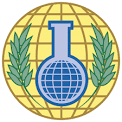THE HAGUE, Netherlands — 15 June 2017 — The Director-General of the Organisation for the Prohibition of Chemical Weapons (OPCW), Ambassador Ahmet Üzümcü, met with senior Chinese officials and delivered a lecture at Peking University during his visit to China from 10 to 15 June.
 In Beijing, the Director-General met with State Councillor, Mr Yang Jiechi; Minister of the Ministry of Industry and Information Technology, Mr Miao Wei; and Counsellor for Arms Control and Disarmament from the Ministry of Foreign Affairs, Mr Shen Jian. He underlined that China was a crucial partner for the OPCW and stated his hope to work with the Chinese government officials on key issues, such as the threat of non-State actors, international cooperation and peaceful uses of chemistry.
In Beijing, the Director-General met with State Councillor, Mr Yang Jiechi; Minister of the Ministry of Industry and Information Technology, Mr Miao Wei; and Counsellor for Arms Control and Disarmament from the Ministry of Foreign Affairs, Mr Shen Jian. He underlined that China was a crucial partner for the OPCW and stated his hope to work with the Chinese government officials on key issues, such as the threat of non-State actors, international cooperation and peaceful uses of chemistry.
On 15 June, the Director-General delivered a lecture at the Peking University on peace and disarmament where he expressed, “The legacy of chemical warfare has wreaked devastation that has been felt around the world and across generations”. He reported that the OPCW continues to verify the destruction of chemical weapons abandoned in China by Japan. Ambassador Üzümcü assured the audience that the cooperation between the Chinese and Japanese governments, supported by the OPCW, continues because “the safe destruction of these weapons is critical to removing risks to people and the environment”. On the same day, the Director-General also appeared live on the China Global Television Network’s show “The Point with Liu Xin”.
Ambassador Üzümcü also paid a visit to the Laboratory of Toxicant Analysis at the Academy of Military Medical Sciences, which is one of the OPCW Designated Laboratories. The Director-General joined a delegation of the OPCW Executive Council for their visit to the Haerbaling Abandoned Chemical Weapon Test Destruction Facility in Jilin Province, north-east China.
Background
People’s Republic of China became party to the Chemical Weapons Convention in 1997. China is a member of the OPCW Executive Council and has representatives in a number of other OPCW subsidiary bodies.
China is actively involved and has offered both financial and in-kind support to many OPCW programmes and projects, including international cooperation, assistance and protection programmes, initiatives for the peaceful uses of chemistry, import-export controls and others.
OPCW cooperates closely with China on the facilitation of the removal and destruction of chemical weapons abandoned on Chinese territory by Japan.
As the implementing body for the Chemical Weapons Convention, the OPCW oversees the global endeavour to permanently and verifiably eliminate chemical weapons. Since the Convention’s entry into force in 1997 – and with its 192 States Parties – it is the most successful disarmament treaty eliminating an entire class of weapons of mass destruction.
To date, nearly 95 per cent of all chemical weapon stockpiles declared by possessor States have been destroyed under OPCW verification. For its extensive efforts in eliminating chemical weapons, the OPCW received the 2013 Nobel Prize for Peace.
